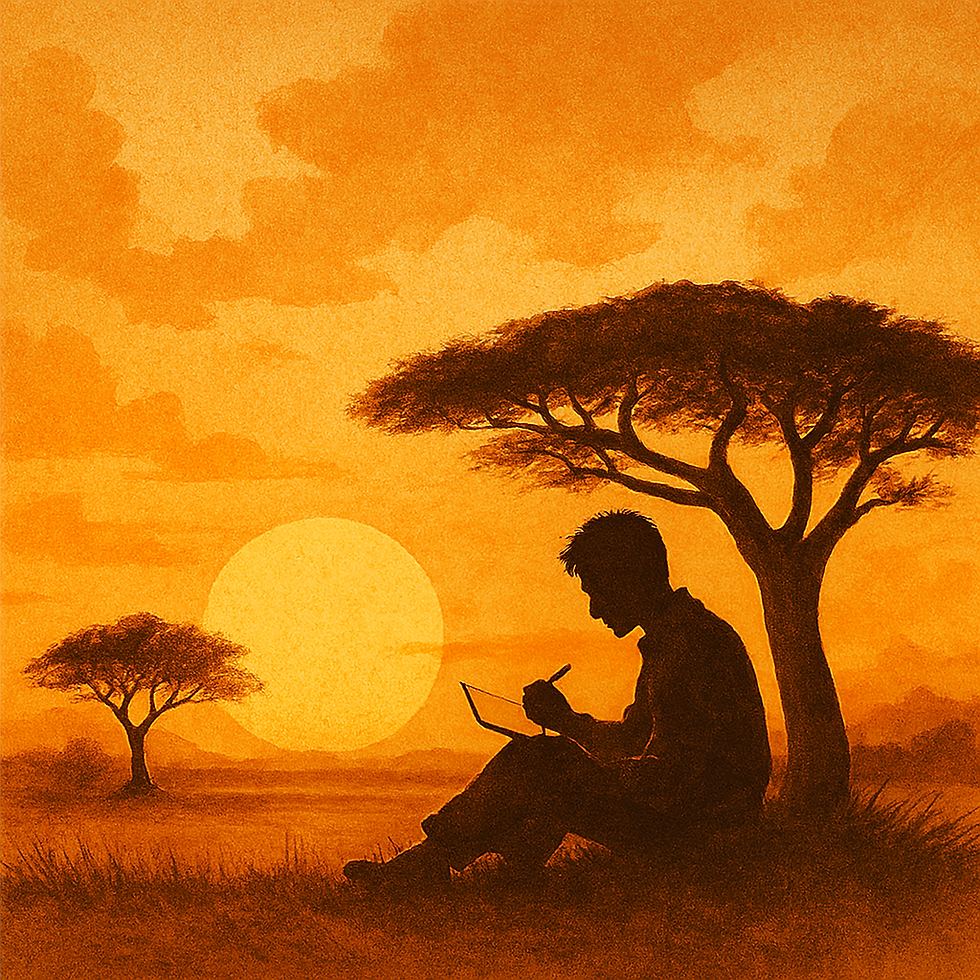Why Aspiring Writers Must Start Now: A Guide to Finding Your Voice and Building Your Craft
- John Mwazemba
- Aug 11
- 3 min read
Updated: Aug 16

"There will be no one like us when we are gone, but then there is no one like anyone else, ever. When people die, they cannot be replaced. They leave holes that cannot be filled, for it is the fate—the genetic and neural fate—of every human being to be a unique individual, to find his own path, to live his own life, to die his own death.” —Dr. Oliver Sacks
In the Beginning
Every writer starts somewhere. I remember when it started—a burden I carried, words that kept clinking in my mind like coins. They were words that couldn’t be contained and needed to be expressed, but I didn’t know how. There is unique discomfort between the time one has the burden of writing and the day one actually puts words onto paper (or MS Word, as the case might be). Writing, for me, when I started it, was like unburdening. It may be the same for you.
Whether it’s a childhood memory, a period of grief, an elder’s proverb, or a dream that keeps haunting you and never lets go, the writing journey begins with the first step.
If you are an aspiring writer wondering how to start, this guide is a simple guide. Just begin where you are with what you have. According to the famous American writer Simon Sinek’s philosophy, the “Golden Circle” is a model that consists of three core items: the why, the how, and the what. We can borrow this to be applied by any writer (aspiring and established).
Step 1: Start with Why You Write
The “why” represents the innermost reason—the core belief or purpose of a person’s writing.
Ask yourself:
What stories do I feel a ‘burden’ to tell?
Whose voices do I carry—family, community, forebears?
What change (impact) do I hope my writing will spark?
Step 2: Ask Yourself What You Will Write About
This is the content of your work. It’s the vessel or form in which your story will be carried. Is it fiction (novels, short stories, poetry) or nonfiction (autobiography, academic report, or a news article)?
Step 3: Ask Yourself How You Will Write
The “how” is where the rubber meets the road. Dreaming is easy. Action is harder. At this point, build your writer’s toolkit. You don’t need expensive software or a degree in literature. You can start with:
A notebook or even a digital notebook/journal
A quiet space (even if it’s just 15 minutes a day)
A writing ritual—tea, music, or silence—something that will instil a daily discipline
A prompt to unlock your voice (e.g., “Describe your childhood in four smells”)
After ticking all these boxes, begin from where you stand. Don’t wait for the perfect sentence. Mine your writing material from your location, language, and lived experience—that is your literary ‘gold’. And this “gold” is unique because no one has the same lived experience as you, and no one ever will. As Dr. Sacks observed, “...there is no one like anyone else, ever... it is the fate—the genetic and neural fate—of every human being to be a unique individual, to find his own path, to live his own life...”. And yes, you have an interesting story we are all waiting to read. It is like no other.
Step 4: Keep Going
The first words you will write will probably scare you into not wanting to write anything else, ever. You compare what you have written with the best sentences you have ever read, and the temptation is to give up. However, continue writing. Write badly. Write courageously. Then revise. And write again.
Remember, as someone said:
Every great writer was once unknown
Your voice matters, even if it shakes
Writing is a craft, not a competition
Conclusion: Your Story Begins Now
You are not alone. This website is your companion—offering mentorship, prompts, publishing insights, and community. Whether you're writing a memoir, fiction, poetry, or a business book, your journey begins with one word.
Call to Action
Subscribe below for periodic writing prompts, join our community forum, and share your first paragraph in the comments below. Then we'll critique and discuss it.
Coming Next
“What Is Writing? Exploring Genres, Story Types, and the Writer’s Purpose”—a deeper dive into the forms and functions of storytelling.









Great and relatable
Very practical advice.